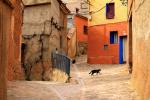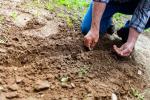H2020 MED-GOLD Project: Converting climate information into added value for traditional Mediterranean food systems based on grapes, olives, and durum wheat
- Type Project
- Status Filled
- Execution 2017 -2022
- Assigned Budget 4.990.967,5 €
- Scope Europeo
- Autonomous community Andalucía; Cataluña; Madrid, Comunidad de
- Main source of financing Horizon 2020
- Project website https://www.med-gold.eu/
Climate service prototypes were co-produced, tested, and validated with key industrial actors in the global food system, using MED-GOLD-linked methods for user engagement and data processing and visualization in the cloud (i.e., the ICT platform). This enabled unprecedented replicability and scalability across regions, sectors, and users, as demonstrated in Colombia with coffee, the world's leading agricultural commodity. Through online surveys and participatory workshops in five languages, the services' usability and scalability potential were assessed with a broader community of users not involved in their development.
An ICT platform was developed as a scalable, modular, cloud-based computing system that enables services such as: running traditional cropping system models; displaying customized visualization dashboards; connecting existing decision support tools and simulation models with state-of-the-art climate data sources (e.g., https://cds.climate.copernicus.eu/). (opens in new window) Processing seasonal climate forecast data with on-the-fly bias correction. The platform was released as open source (see https://github.com/medgold-ict-platform). Colombian coffee provided a case study to test the replicability of MED-GOLD climate services, showing high potential benefits in terms of informing regional crop management and policymaking. The analysis of the EU market for climate services and the development of a business plan provided a solid basis for the commercialization of the prototype services, by describing the value creation and service delivery processes.
The project built better-informed and connected communities of end-users and policymakers for the global olive oil, wine, and pasta food systems by presenting at over 50 international events; organizing 12 participatory workshops, including eight; hosting two online training events and four webinars; and publishing fact sheets, user guides, infographics, videos, a policy brief, and a glossary, all in six languages (English, Greek, Spanish, Portuguese, French, and Italian). This was in addition to the multimedia and multilingual communication implemented throughout the project and 25 published scientific articles, in addition to a special project issue that will appear in the journal Climate Services.
The COVID-19 emergency significantly impacted the project. Considerable effort was devoted to converting planned in-person activities into online activities. A notable outcome was the final MED-GOLD presentation event, with over 300 registered contacts from around the world and speakers from industry, NGOs, international institutions, and the policy community. Industry users in the MED-GOLD consortium shared success stories, and the event allowed participants to share and exchange ideas on the potential for applying and using MED-GOLD pilot services in their own cross-sectoral decision-making contexts. Key dissemination materials produced by the project are available through the MED-GOLD Horizon 2020 Project Community on Zenodo (https://zenodo.org/communities/med-gold/).
MED-ORO ( https://doi.org/10.3030/776467 ) was a 54-month research and innovation project that aimed to demonstrate the feasibility of climate services in agriculture using three distinctive elements of the Mediterranean food system: grapes and wine, olives and olive oil, and durum wheat and pasta. The project prototyped climate services by developing case studies for these three main traditional Mediterranean systems.
Climate services—the transformation of climate-related data and information into customized projections, forecasts, and analyses to support decision-making at all levels—have the potential to become the foundation of a climate-resilient, low-carbon society. Agriculture is the economic sector most vulnerable to climate variability and change. Furthermore, the Mediterranean region is under immediate threat from shifting weather patterns and their resulting ecological, economic, and social impacts. Therefore, developing the capacity to convert the ever-increasing climate data into climate services that can inform decision-making in agriculture is a key priority at the Mediterranean, European, and global levels. The long-term objective of this project was to make European agriculture and food systems more resilient to climate change, using climate services to minimize risks and costs and seize opportunities to generate added value. MED-GOLD aimed to develop climate services for the cropping systems that underlie the production of olive oil, wine, and pasta. These services have fundamental climatic, ecological, economic, and cultural relevance for the Mediterranean region and the world, as they are not only distinctive elements of the Mediterranean diet's global heritage, but also food products with a global market.
Furthermore, the Mediterranean food system has demonstrated its potential to counteract the increasing homogeneity of the global food supply, resulting in increased food security and significant health benefits, as well as a reduction in the ecological footprint of the global food system. Therefore, the potential for developing climate services with high added value for society is immense. To directly address this added value, MED-GOLD co-designed pilot climate services that involved both providers and users. The project reviewed the operational decision-making of major European industrial users to identify key decisions or new actions that can benefit from climate information on timescales ranging from months to decades.
MED-GOLD will demonstrate the feasibility of climate services in the agricultural sector by developing case studies for three key sectors of the Mediterranean food system: grapes, olives, and durum wheat. Agriculture is primarily climate-driven and therefore highly vulnerable to climate variability and change. Evidence suggests that the Mediterranean region is under immediate threat from changing weather patterns and their resulting ecological, economic, and social impacts.
Therefore, developing the capacity to convert the ever-increasing amount of climate data into personalized climate services that can inform agricultural decision-making is a priority both in Europe and around the world. The long-term objective of this project is to make European agriculture and food systems more competitive, resilient, and efficient in the face of climate change, using climate services to minimize climate-related risks and costs and seize value-added opportunities. The MED-GOLD project aims to develop climate services for olive, grape, and durum wheat cultivation systems, which underlie the production of olive oil, wine, and pasta. This set of crops and related food products is of paramount climatic, ecological, economic, and cultural importance to the Mediterranean region. Since olive oil, wine, and pasta are not only distinctive elements of the Mediterranean diet but also food products with a global market, there is considerable potential for the development of high-value-added climate services for olives, grapes, and durum wheat.
A key challenge is to co-design prototypes of pilot service applications involving both providers and users of the three main traditional Mediterranean farming systems, in order to demonstrate the added value of data- and information-driven responses to changes in the climate system. Users' operational decision-making will be reviewed to identify key decisions or introduce new actions that can benefit from climate information on different timescales, from months to decades.
- AGENZIA NAZIONALE PER LE NUOVE TECNOLOGIE, L'ENERGIA E LO SVILUPPO ECONOMICO SOSTENIBILE
- LUTECH SPA
- MET OFFICE
- HORTA SRL
- BARILLA G. E R. FRATELLI SPA
- UNIVERSITY OF LEEDS
- SOGRAPE VINHOS SA
- CONSIGLIO NAZIONALE DELLE RICERCHE
- DCOOP SOCIEDAD COOPERATIVA ANDALUZA
- EASYTOSEE AGTECH, SOCIEDAD LIMITADA
- ETHNIKO ASTEROSKOPEIO ATHINON
- UNIVERSIDAD MILITAR NUEVA GRANADA
- PANEPISTIMIO THESSALIAS
- CONSIGLIO PER LA RICERCA IN AGRICOLTURA E L'ANALISI DELL'ECONOMIA AGRARIA
- BARCELONA SUPERCOMPUTING CENTER CENTRO NACIONAL DE SUPERCOMPUTACION
- GMV AEROSPACE AND DEFENCE SA
- JRC -JOINT RESEARCH CENTRE- EUROPEAN COMMISSION
- Project website (CORDIS)
- CORDIS project factsheet (pdf)
- Website of AGENZIA NAZIONALE PER LE NUOVE TECNOLOGIE, L'ENERGIA E LO SVILUPPO E…
- LUTECH SPA website
- MET OFFICE website
- HORTA SRL website
- BARILLA G. E R. FRATELLI SPA website
- University of Leeds website
- CONSIGLIO NAZIONALE DELLE RICERCHE website
- ETHNIKO ASTEROSKOPEIO ATHINON website
- PANEPISTIMIO THESSALIAS website
- Website of CONSIGLIO PER LA RICERCA IN AGRICOLTURA AND L'ANALISI DELL'ECONOMIA …
- Website of the Barcelona Supercomputing Center
- JRC -JOINT RESEARCH CENTER- EUROPEAN COMMISSION website







